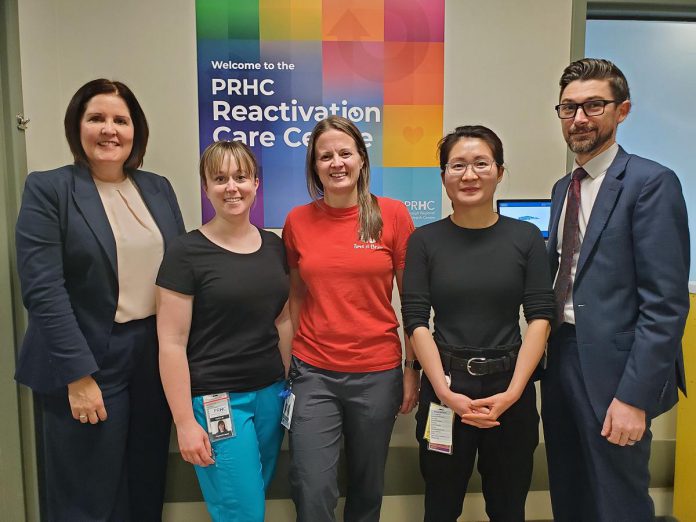
With the help of community donors, Peterborough Regional Health Centre (PRHC) officially opened its new Reactivation Care Centre on Monday, December 9. The 12-bed specialized medical unit is designed to support patients as they prepare to return home once they no longer require acute care at the hospital.
“The hope is that we’ve set up such a robust integrated and collaborative care model for patients that they are successful upon discharge,” says Sarah Berges, Director of Medicine, Transitional Care, and Seniors’ Health at PRHC. “It is grounded in the foundation of specialized care for older adults and represents the future of healthcare by improving the patient and caregiving experience and improving the health of the population, while also strengthening PRHC’s ability to lead system transformation.”
The unit is focused on the care of seniors and is a key initiative of PRHC’s Seniors’ Care Centre of Excellence and its “home first” philosophy. Patients are aided both in their health and functional needs for their return home. The unit is grounded in the Institute for Healthcare Improvement’s “4Ms” framework for an Age-Friendly Health System which outlines key elements of high-quality older adult care: medication, mobility, what matters to me, and mentation.
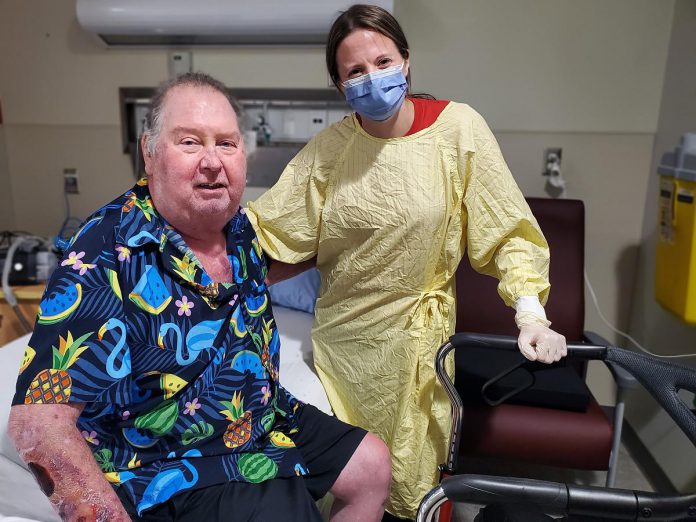
“The key thing on admission to the unit is that staff work collaboratively with patients and their caregivers to gain an understanding of what matters most to them that will help them get home,” says Berges. “We’re embedding the allied care team that supports patients to be active in their care, establishing an understanding of a patient’s baseline functions, what their opportunities for improvement are, and helping them to regain their strength and confidence. We’re going to meet the patients where they’re at and make sure that we’re maximizing their function.”
The Reactivation Care Centre will take a customized approach to the unique needs of each patient with input from an interdisciplinary care team that includes nurses, occupational therapists, speech language pathologists, physiotherapists, pharmacists, rehabilitation assistants, recreational therapists, social workers, dietitians, and many more professionals.
“We have a really engaged and passionate group of staff who have joined us in the unit with a very focused approach,” says Berges. “They all work together to create the best care for that patient using their expertise and working to the full scope they have to offer.”
Along with patient beds, vital signs monitors, and specialized wheelchairs, the unit’s technology includes digital “collaboration boards” provided through Cisco Canada’s Country Digital Acceleration Program. Installed in patient rooms, the boards support day-to-day care by enhancing secure communication between healthcare providers, patients, and their families, ultimately improving the overall patient experience.
“This will engage the patient so they’re more empowered to be part of their care,” Berges explains. “We are hopeful that as the technology continues to grow and develop with us, that patient will know when they’ve attained their goals.”
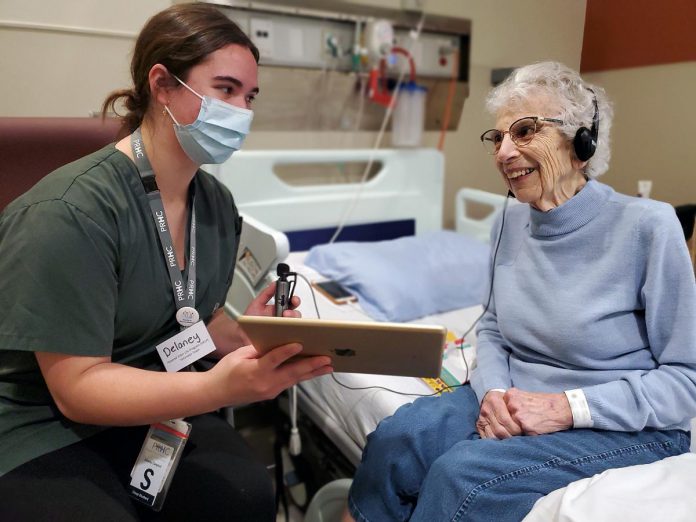
By having a comprehensive care plan in place to support patients for a successful return home, the unit aims to reduce the length of stay in acute-care hospital beds as well as to prevent readmissions.
“The idea is that if we can maximize these older adults from a functional perspective, they can return home and be much more successful in the community because we have set them up for success,” says Berges.
The Reactivation Care Centre is a pilot project that not only aims to address the need for specialized seniors’ care given the growing and aging population in the region, but to reimagine how healthcare can be delivered in other areas of care as well.
“The idea is that this is a model of care that could be then transferred to any healthcare setting if you get the right mix of team and the right approach to care,” says Berges. “We can grow our learning within our own facility and share our knowledge with other centres, demonstrating how we can provide care in a different way. It doesn’t need to be in this small microcosm of a unit, but we can actually expand this across the organization and across hospital sites.”
$400,000 in funding for the Reactivation Care Centre was made possible through community donations to the PRHC Foundation’s $60 million Campaign for PRHC, with one of the priority areas for the campaign being to address urgent needs at the hospital as they arise.
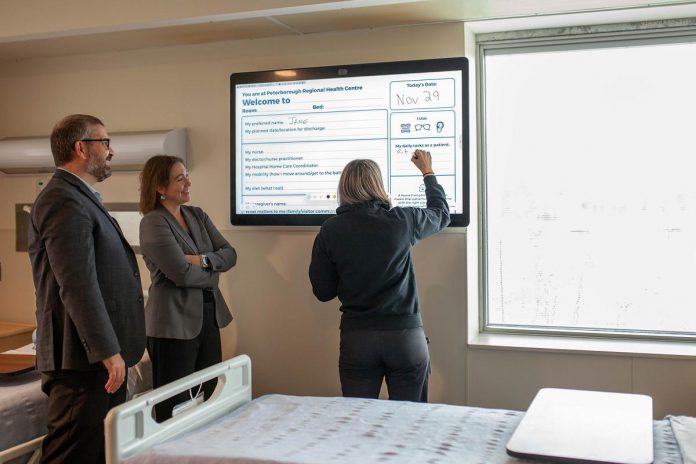
“Our campaign donors who give undesignated gifts are empowering us to do what the hospital needs when they need it,” says Lesley Heighway, President and CEO of the PRHC Foundation. “It’s great to be in a position where we’re able to be responsive when these wonderful opportunities for innovation and advancement arise.”
This flexibility has been instrumental in allowing PRHC to adapt to the community’s most pressing needs. In recent years, funding for urgent needs at the hospital have supported emergency COVID-19 responses, an investment in critical Emergency Department equipment that supports the hospital’s Level III Trauma Centre designation, and technology in the Neonatal Intensive Care Unit, Labour & Delivery, Breast Assessment Centre, Palliative Care Unit, Laboratory, and Diagnostic Imaging.
“It’s donors who made this happen, by allowing and trusting the Foundation to be responsive,” Heighway says. “While we are typically looking at the long-term needs of the hospital, being nimble to address short-term needs is very important. Our hospital is very innovative, and this ‘highest priority’ focus area of our campaign allows the Foundation to support some of that innovation.”
“The Foundation’s ability to meet our urgent need as we are dealing with capacity issues every single day has allowed us to pivot and do something really innovative,” adds Berges. “It is giving PRHC the chance to lead innovative healthcare, which is really exciting.”
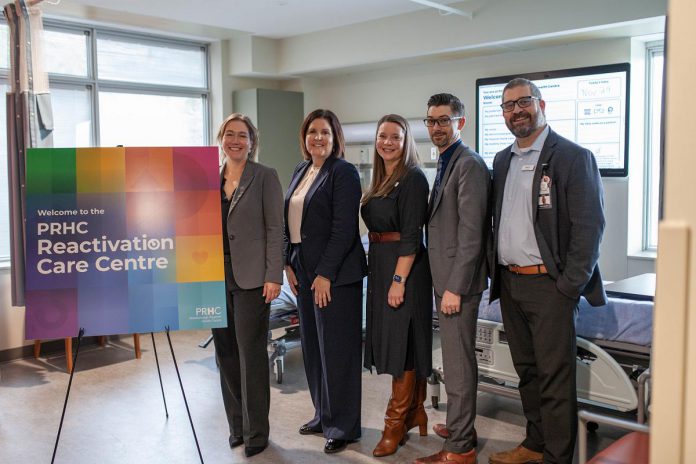
Berges notes there are already plans to develop the Reactivation Care Centre by creating an environment that is “more realistic to home” to support patient transition. One idea is for a tea and coffee station where patients can practise their functional motor and cooking skills as they prepare to return home.
“Equipping the unit with the equipment, supplies, and technology that we need to support these patients in a different way allows us to operationalize best practices for care for older adults,” says Berges.
She adds that the Reactivation Care Centre would not have been possible without the support of community donations to the PRHC Foundation.
“It was the passion of these donors to bring something new and innovative to the hospital that has allowed us to get here. Their willingness to join us on this journey has been fantastic.”
For more information on how the PRHC Foundation’s $60 million Campaign for PRHC will reimagine healthcare at the regional hospital, and to make a donation to the campaign, visit prhcfoundation.ca.
This branded editorial was created in partnership with the Peterborough Regional Health Centre Foundation. If your organization or business is interested in a branded editorial, contact us.


























